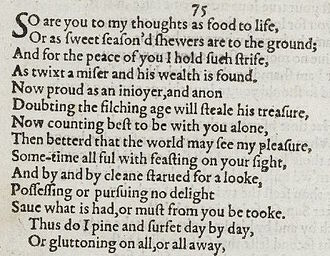Sonnet 75
« » Sonnet 75 | |||||||
|---|---|---|---|---|---|---|---|
 Sonnet 75 in the 1609 Quarto | |||||||
 | |||||||
| |||||||
Sonnet 75 is one of 154 sonnets written by the English playwright and poet William Shakespeare. It is a member of the Fair Youth sequence, in which the poet expresses his love towards a young man.
Synopsis
The poet expresses his complete pleasure in the presence of his beloved, but says that his devotion resembles that of a miser to his money, filled with anxiety combined with pleasure in his wealth.
Structure
Sonnet 75 is an English or Shakespearean sonnet. The English sonnet has three quatrains, followed by a final rhyming couplet. It follows the typical rhyme scheme of the form, ABAB CDCD EFEF GG, and is composed in iambic pentameter, a type of poetic metre based on five pairs of metrically weak/strong syllabic positions. The 4th line exemplifies a regular iambic pentameter:
× / × / × / × / × / As 'twixt a miser and his wealth is found. (75.4)
The 6th line exhibits two common variations: an initial reversal and a final extrametrical syllable or feminine ending:
/ × × / × / × / × / (×) Doubting the filching age will steal his treasure; (75.6)
- / = ictus, a metrically strong syllabic position. × = nonictus. (×) = extrametrical syllable.
Line 8 necessarily repeats the 6th line's feminine ending. Possible initial reversals also occur in lines 1, 2, 3, 9, 12, and 13; though these can be interpreted in other ways.
The meter demands a few variant pronunciations: in the 2nd line, "showers" functions as 1 syllable, and in the 10th line "starvèd" functions as 2.[2]
Notes
- ^ Pooler, C[harles] Knox, ed. (1918). The Works of Shakespeare: Sonnets. The Arden Shakespeare [1st series]. London: Methuen & Company. OCLC 4770201.
- ^ Booth 2000, p. 67.
References
- First edition and facsimile
- Shakespeare, William (1609). Shake-speares Sonnets: Never Before Imprinted. London: Thomas Thorpe.
- Lee, Sidney, ed. (1905). Shakespeares Sonnets: Being a reproduction in facsimile of the first edition. Oxford: Clarendon Press. OCLC 458829162.
- Variorum editions
- Alden, Raymond Macdonald, ed. (1916). The Sonnets of Shakespeare. Boston: Houghton Mifflin Harcourt. OCLC 234756.
- Rollins, Hyder Edward, ed. (1944). A New Variorum Edition of Shakespeare: The Sonnets [2 Volumes]. Philadelphia: J. B. Lippincott & Co. OCLC 6028485. — Volume I and Volume II at the Internet Archive
- Modern critical editions
- Atkins, Carl D., ed. (2007). Shakespeare's Sonnets: With Three Hundred Years of Commentary. Madison: Fairleigh Dickinson University Press. ISBN 978-0-8386-4163-7. OCLC 86090499.
- Booth, Stephen, ed. (2000) [1st ed. 1977]. Shakespeare's Sonnets (Rev. ed.). New Haven: Yale Nota Bene. ISBN 0-300-01959-9. OCLC 2968040.
- Burrow, Colin, ed. (2002). The Complete Sonnets and Poems. The Oxford Shakespeare. Oxford: Oxford University Press. ISBN 978-0192819338. OCLC 48532938.
- Duncan-Jones, Katherine, ed. (2010) [1st ed. 1997]. Shakespeare's Sonnets. Arden Shakespeare, third series (Rev. ed.). London: Bloomsbury. ISBN 978-1-4080-1797-5. OCLC 755065951. — 1st edition at the Internet Archive
- Evans, G. Blakemore, ed. (1996). The Sonnets. The New Cambridge Shakespeare. Cambridge: Cambridge University Press. ISBN 978-0521294034. OCLC 32272082.
- Kerrigan, John, ed. (1995) [1st ed. 1986]. The Sonnets ; and, A Lover's Complaint. New Penguin Shakespeare (Rev. ed.). Penguin Books. ISBN 0-14-070732-8. OCLC 15018446.
- Mowat, Barbara A.; Werstine, Paul, eds. (2006). Shakespeare's Sonnets & Poems. Folger Shakespeare Library. New York: Washington Square Press. ISBN 978-0743273282. OCLC 64594469.
- Orgel, Stephen, ed. (2001). The Sonnets. The Pelican Shakespeare (Rev. ed.). New York: Penguin Books. ISBN 978-0140714531. OCLC 46683809.
- Vendler, Helen, ed. (1997). The Art of Shakespeare's Sonnets. Cambridge, Massachusetts: The Belknap Press of Harvard University Press. ISBN 0-674-63712-7. OCLC 36806589.
- v
- t
- e

| Plays |
|
|---|---|
| Poems |
and works
| Institutions |
|---|
- Anne Hathaway (wife)
- Susanna Hall (daughter)
- Hamnet Shakespeare (son)
- Judith Quiney (daughter)
- Elizabeth Barnard (granddaughter)
- John Shakespeare (father)
- Mary Arden (mother)
- Gilbert Shakespeare (brother)
- Joan Shakespeare (sister)
- Edmund Shakespeare (brother)
- Richard Shakespeare (grandfather)
- John Hall (son-in-law)
- Thomas Quiney (son-in-law)
- ✻ Shakespeare and other authors
- † Lost
 Category
Category WikiProject
WikiProject














